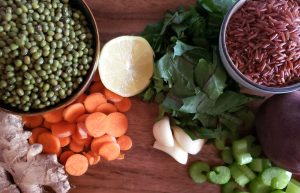 Our liver is one of the most vital organs of the body, as it plays a key role in our digestion; regulates cholesterol and hormone levels; metabolizes fats, proteins, and carbohydrates; stores vitamins and minerals; and detoxifies our blood. With our heavily polluted environment, over-medicated society, and excessively refined and processed diets, it is no surprise that our livers are often worn down, sluggish, and toxic by adulthood. We may not be able to control our environmental pollutants or the medications that are needed for our healthcare, however, we can certainly reduce the stress on our liver through a healthy diet, herbal medicine, and routine cleansing.
Our liver is one of the most vital organs of the body, as it plays a key role in our digestion; regulates cholesterol and hormone levels; metabolizes fats, proteins, and carbohydrates; stores vitamins and minerals; and detoxifies our blood. With our heavily polluted environment, over-medicated society, and excessively refined and processed diets, it is no surprise that our livers are often worn down, sluggish, and toxic by adulthood. We may not be able to control our environmental pollutants or the medications that are needed for our healthcare, however, we can certainly reduce the stress on our liver through a healthy diet, herbal medicine, and routine cleansing.
The liver is simply an organ we cannot live without, and therefore a healthy liver is needed to truly obtain optimal physical health. If your liver is over-stressed, congested, weak, toxic, or inflamed, its functional integrity begins to dampen and can create many issues. The liver is the organ that is responsible for detoxifying and purifying our blood and therefore our entire system. If we are overloaded with toxins through improper diet, repressed emotions (aka mental toxins), environmental pollutants, and general unhealthy living habits, our liver becomes overtaxed, congested, weak, and sluggish, and can lead to a wide variety of symptoms and eventually to full-blown disease. Here are some common symptoms to look out for that may indicate you are experiencing some weakness in your liver.
Common Signs And Symptoms Of A Weak Liver
- Poor digestion
- Sluggish metabolism
- Pain or nausea after eating oily, fatty foods
- Pain behind the lower right ribs (upper right abdominal region)
- Hormonal imbalances
- Hemorrhoids
- Chronic fatigue
- Skin disorders including acne, rash, eczema, and psoriasis
- Excessive toxins in the body (click here to see if you have toxins)
- Dark urine
- Yellowish skin or eyes
- Puffiness directly above the eyes
- Vertical line that is located beside the inner right eyebrow (see facial diagnosis chart here)
By performing annual or biannual cleansing at the appropriate times, we can begin to reduce the inevitable toxins we accumulate and reduce the stress on our liver. Performing a liver-specific cleanse goes even a step further by flushing out this vital organ directly while nourishing, strengthening, and improving its ability to function.
The Liver And Our Emotions
The liver is the organ that relates to the anger emotion and therefore excessive, repressed anger throughout our lives will begin to take its toll on the liver. The liver carries this emotion and in turn, it creates excessive heat, stress, inflammation, and eventually burnout if this anger is not properly digested, processed, and released. Therefore any well-rounded liver cleanse should include some therapies to help heal our deep-rooted anger through meditation, pranayama (breathwork), abhyanga (oil massage), and gentle Yoga postures that will help release this emotion from our tissues (i.e. gentle twists, reclined postures, forward folds).
Getting Started
Before jumping into any cleanse, it is best to plan out your schedule in order to make sure you are cleansing at the appropriate time in your life. Here are some situations in which a more rigorous cleanse should be avoided:
Do Not Perform A Cleanse During:
- Excessively hot or cold weather
- Menstruation
- Pregnancy
- Postpartum
- Breastfeeding
- Major life changes (change in job, divorce, loss of loved one, move)
- While traveling or directly before traveling
- While sick
- During times of heavy workloads and high levels of stress
A cleanse can be performed in any amount of time that is appropriate for your current schedule, level of strength, level of health, age, and environment. Generally, most individuals perform an at-home kitchari cleanse for 3, 5, or 7 days, along with the proper amount of pre-cleansing and post-cleansing days that fall directly before and after the cleanse.
Before beginning the cleanse, it is best to allow 3 to 7 days for the pre-cleanse period. This time is used to prepare the system by gently beginning to lubricate the body, strengthen the digestive fire, and encourage healthy elimination in order to ensure a smooth transition into the cleanse.
For more details on how to perform the pre-cleanse, click here.
Eating a mono-diet of kitchari, while taking cleansing herbs and teas, and performing the recommended therapies can be fairly depleting to your energy. Your lower energy levels must be honored in order to avoid long-term health issues. Please avoid working too much, laborious activities, and strenuous exercise during the entirety of the cleanse. Rest and relaxation are a huge part of the detoxification process and will make your cleansing experience much more powerful, effective, and fulfilling.
Performing a cleanse of any kind creates sensitivity in your nervous system, brings up stored emotions, and opens your energy field. This means that it will be very important to avoid excessive electronics, social activities, stimulating situations, arguments, yelling, being in crowds, and the like, in order to ensure unwanted energy does not fill up your system during this fragile time.
Ayurvedic Necessities For Your Cleanse
Herbal Necessities
- Tikta Ghrita
- Love Your Liver Tincture
- Detox Tea (substitute with tea recipes below if needed)
- Triphala Churna
- Ginger Bath Blend **omit with any current skin issues such as eczema or rash**
Recommended Recipes
- Liver Cleansing Kitchari
- Pitta-Reducing Tonic
- CCF Tea
- Extra Potent Ginger Tea
- Hot water with lemon
- Ginger Detox Bath
Other
- Medicated oil for oil massage
- Tongue scraper
Once you have found the right time for your cleanse and you have collected all of your necessities, you can begin to plan your daily schedule that will be needed to get the most out of this Ayurvedic liver cleanse. As you will see, a cleanse can be very time-consuming, which is even more reason to take some downtime during this program. I would recommend following the chart as closely as you can for the allotted time of your cleanse and being as consistent as possible with the recommended diet, herbs, and activities. If at any time you feel excessively weak or that this experience is too much, please listen to your body and slowly ease out of the cleanse by following our post-cleanse recommendations.
*Always consult with your doctor before beginning any new healthcare program.
Click here for a PDF copy of this chart.
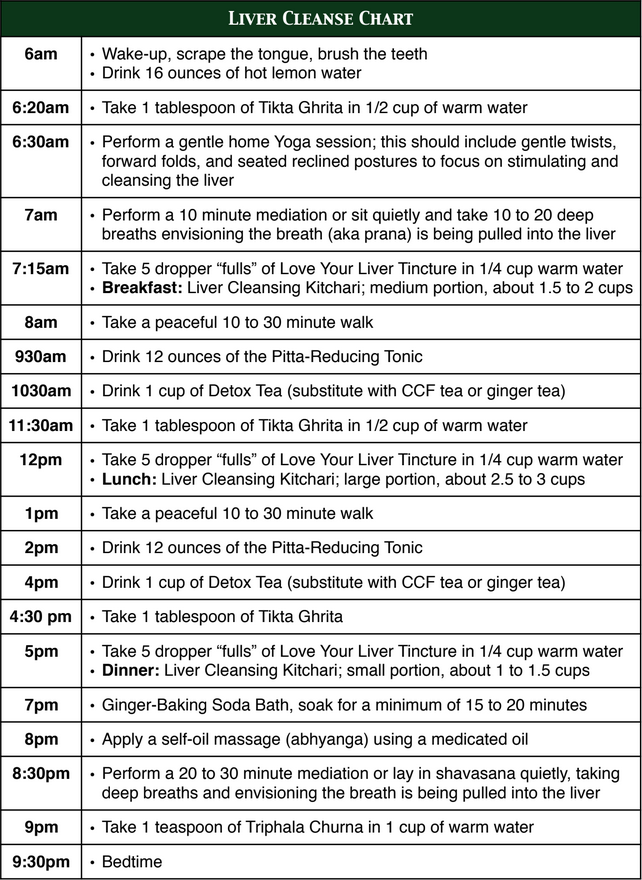
Important Notes (Please read!!)
- If home Yoga is not for you, aim to take a gentle Yoga class as many days as possible during the cleanse. This recommendation can also be replaced with meditation or deep breathing practice.
- When performing the oil massage, it is recommended to begin by massaging the outer limbs and stroke in the direction of the abdominal area. This method is typically done during a cleanse to move the toxins from the periphery to the GI tract, where they can be eliminated.
- When performing the oil massage, spend a few minutes at the end massaging the upper right abdomen in small clockwise* circles. Then take a few moments to massage the abdomen as a whole in the same direction. *Massage up on the right, down on the left.
- If the Tikta Ghrita is causing nausea, avoid eating until hunger returns. To reduce nausea, a small pinch of salt or 1/4 teaspoon of Trikatu Churna can be added to the Tikta Ghrita in order to help it digest better.
- If you do not have a gallbladder, it is recommended to avoid taking the Tikta Ghrita, as well as any oil that is called for in the kitchari recipe.
- If you are experiencing any skin condition such as eczema, psoriasis, body acne, or rash, please do not perform the ginger baths or any hot baths. This may cause further irritation.
- If you have a liver disorder or any health condition, always check with your doctor before starting any new healthcare program.
- If you are on prescribed medications, do not stop taking them during the cleanse. Always consult with your doctor before taking any new herbs, foods, or teas. Always consult with your doctor before starting any new healthcare program.
Coming Out Of The Cleanse
Once you have completed your cleanse, please do not run and eat some pizza! The week after a cleanse (or longer) is considered the post-cleanse phase and is just as important as the cleanse itself. A cleanse is a lightening, reducing period, and therefore the post-cleanse period is the essential time for rebuilding, rejuvenating, and refilling the body (and mind) in a healthy manner. Without this, the body may become depleted, health conditions may worsen, and the mind may become disturbed.
For more details on how to perform the post-cleanse, click here.
Conclusion
Cleanses of any kind takes time, energy, awareness, and discipline. This particular liver detox program is a great regimen to perform once a year to cleanse your liver, reduce its workload, and improve its functioning. This cleanse can also be a great pathway for you to incorporate these healing practices into your daily routine in order to maintain the health and balance that is established with the cleanse. No matter the level of intensity you choose for your liver cleanse, it is always best to listen to your body and your individual needs. If something does not feel right, it is likely not right for you. Honor your inner intelligence and make this cleanse your own. By being diligent, yet compassionate to your feelings, you can use this cleanse to maintain health, alleviate disorder, and create a higher quality of life for years to come!
Complement your cleanse with my Love Your Liver Tincture!

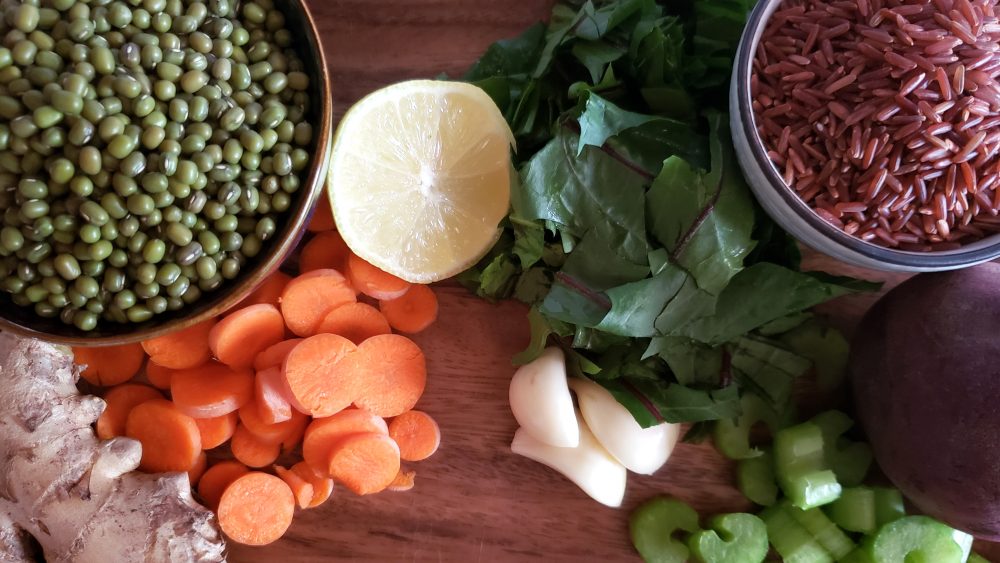
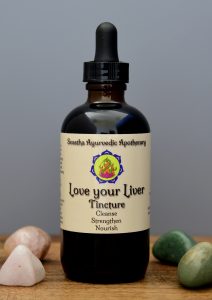
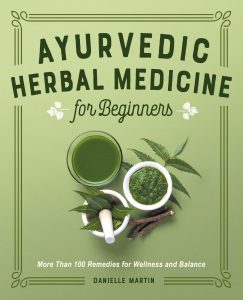

Hello! Thank you for all this amazing info. Is it ok to take daily supplements while on this cleanse??
I take magnesium glycinate and melatonin each night for sleep, along with CBD oil on my feet. Any thoughts appreciated!
Hi Sarah,
Thank you for your question! It is recommended to avoid any supplements that are not 100% essential during the time of your cleanse. If the supplements you are taking are needed to help you sleep or calm severe anxiety (for example), then I would continue to take them however. If you are able to function normally without taking them for several days, then I would discontinue them until the cleanse is complete. Please use your best judgement and listen to your body.
Thank you again for this great question. Let me know if anything else comes up!
Namaste,
Danielle
Hi there – I am wondering why you have suggested to do the oil massage after the bath? I thought classically in Ayurveda the oil massage should come before the bath or shower? Also there is no space in the cleanse for a morning shower – is this intentional?
Hi Sanji,
Thank you for your questions!
I recommended the abhyanga oil after the bath mainly because I wanted the oil to be left on overnight. The warm bath also opens up the pores in the skin and enhances the absorption of the oil. You are correct however, the classical suggestion would be to take the bath about 30 minutes after the application of the oil, mainly because the oil is traditionally applied in the morning and you would not want to have oily skin as you went through your day. Either method is beneficial however, and can be interchanged as per the preference of the individual.
In regards to the morning shower, it is not on the chart only because I did not think about it. You should definitely take a warm, refreshing shower each morning. The best time would be either directly before or after the gentle Yoga session.
Thank you again for these great questions! Please let me know if anything else comes up and I will be happy to help!
Namaste,
Danielle
Hi,
I have been having an episode of pancreatitis, and have difficulty digesting even small amounts of fat. I’m guessing my liver is also weak. Is it safe for me to undertake a cleanse?
Thank you!
Hi Nandita,
I am sorry to hear you are experiencing this issue with your pancreas. Cleansing and strengthening your liver should help to strengthen your pancreas as well. Since you are dealing with an acute episode at the moment, I would make sure to perform the liver cleanse in a mild manner and listen to your system if it is telling you that it is too much to process.
I would also avoid any ghee (including Tikta Ghrita) or oils in the food and herbal cleansing regimen. The Detox Tea, Tripahla Churna, and the mono-diet of Kitchari should be suitable however. You can add in the Liver Tincture, but use a smaller dosage to begin and only increase to the recommended dosage if your body can handle it.
I hope this finds you well, my friend! Please let me know if anything else comes up!
Namaste,
Danielle
Hello! I wonder where I find these remedies / tinctures or what’s in them to make them or where to buy them in this list that you post in your article:
Herbal Necessities
Tikta Ghrita
Love Your Liver Tincture
Detox Tea (substitute with tea recipes below if needed)
Triphala Churna
Ginger Bath Blend **omit with any current skin issues such as eczema or rash**
Tikta Ghrita and Triphala I can find, and ayurvedic detox tea I have too, but whats in the Love Your Liver Tincture? Or from which brand can I buy this one? Much love
Sarah
Hi Sarah,
Thank you for writing in with your question! I actually have all of these products available through my Etsy shop which you can find here: https://www.etsy.com/shop/SvasthaAyurveda.
They are all currently in stock except for the Love Your Liver Tincture (sorry!). I should have this back in stock by late February or early March (2022), but my Daily Detox Formula would be a great replacement for the liver cleanse in the meantime.
If you have any issues finding these products, or have any questions otherwise, feel free to email me directly at info@svasthaayurveda.com.
Happy cleansing:)
Namaste,
Danielle